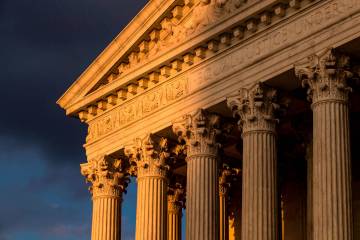EDITORIAL: Civil forfeiture cases head to the US Supreme Court
It’s bad enough that the government may seize a person’s property without ever charging that person with a crime. It’s even worse when innocent victims are denied their day in court to contest such actions.
Last week, the U.S. Supreme Court agreed to hear two cases involving civil forfeiture and delayed justice. The cases offer the court a chance to minimize civil forfeiture abuses.
Both cases stem from small-town Alabama. One involves a woman who loaned her vehicle to her son, who was pulled over and charged with marijuana possession. The other features a woman who gave her car to a friend, who was stopped by police and charged after they found methamphetamine.
In both cases, police used civil forfeiture laws to seize the vehicle though the owner wasn’t involved in the alleged wrongdoing. In both cases, the women fought to get their cars back but had to wait for more than a year before a court ruled in their favor.
“The government should not be able to take your car,” said Dan Alban, a senior attorney at the Institute for Justice, “without providing you with a prompt opportunity to challenge the seizure.”
Mr. Alban points out that, in criminal proceedings, the government must hold a probable cause hearing soon after an arrest so a judge can determine whether the charges are appropriate. No such rule applies to civil cases, which raises significant due process questions, particularly when it involves the private property of potentially innocent owners.
Lower federal courts have split on how fast the government must adjudicate cases involving civil forfeiture. But allowing lengthy delays would only further compound the injustice of an insidious practice that allows law enforcement agents to take cash, homes and other valuables from people who are only suspected of being involved in a crime.
Civil forfeiture laws proliferated in the 1980s and were intended to separate drug kingpins and crime lords from their ill-gotten gains. But the practice has evolved into a lucrative moneymaker for many police agencies, which are often allowed to keep a portion of the proceeds generated by seizures, opening the door to abuse. Traditional rules of “innocent until proven guilty” are reversed, and those who lose property face a difficult and expensive task in civil court.
Federal forfeiture laws should be reformed to ensure that only those who have been convicted in a court of law lose their property to the government. But until Congress acts, the Supreme Court should recognize that justice requires prosecutors to give plaintiffs who have been wronged a timely day in court.

















